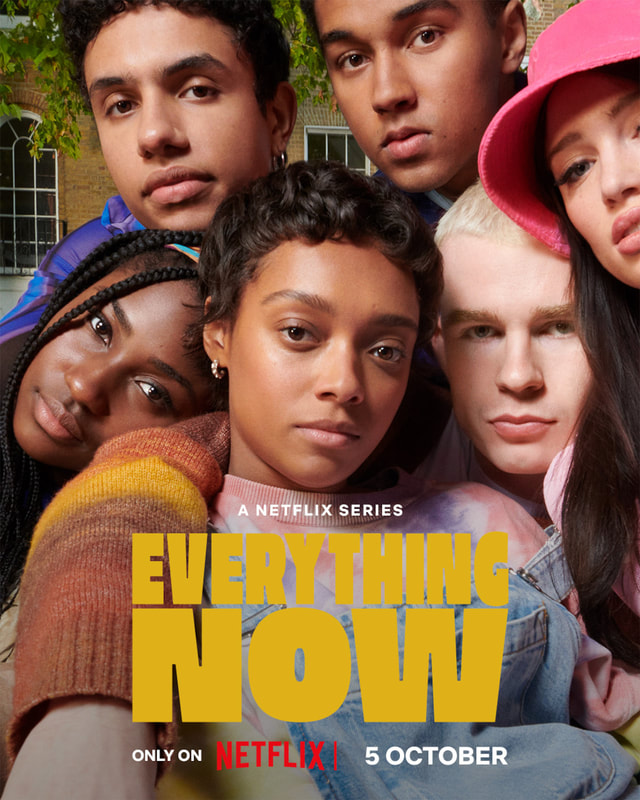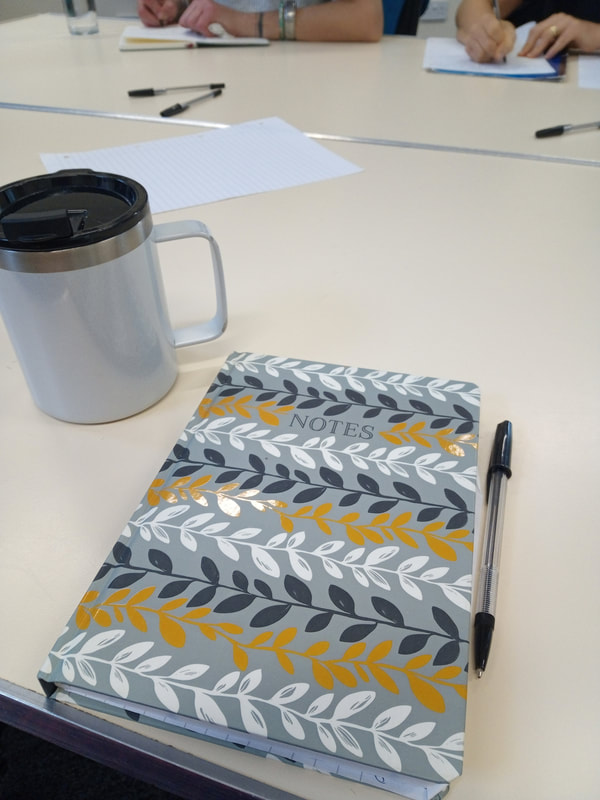Everything Now: what does it get right about eating disorders and where does it fall short?11/19/2023 Spoilers! Everything Now is a coming-of-age drama comedy on Netflix, with a protagonist in eating disorder recovery. If you haven’t seen it, maybe go and watch it and come back, or if you’re not fussed about spoilers or have no intention of watching it and want to keep reading, then crack on! I’m a counsellor and I work with people with eating disorders, disordered eating and body image problems. I’ve worked for eating disorder charities for over 7 years now, but this does not make me an expert, these are just my opinions on the show and how they dealt with the topic. Firstly, Everything Now passed the basic bare minimum test… not showing triggering eating disorder images/scenes. When they included some ED behaviours, they were off camera and they included a warning before the episode (and they included help resources after each episode too). This already makes this show better than most other things about eating disorders, but the bar was pretty low. BEAT have some media guidelines which should be utilised by any media outlet, filmmaker or creator, but sadly this has not always been the case, as we see with shock-factor eating disorder tabloid articles, and in films such as To the Bone, which shows specific eating disorder behaviours and images of very thin bodies. Everything Now not only avoided this, they didn’t portray the protagonist, Mia, as being someone who just wants to be skinny to copy influencers on social media. This lack of emphasis on body image and vanity is refreshing, and the show demonstrates throughout that eating disorders are so much more than just negative body image or a diet gone too far. I also loved the casual queerness, by that I mean they never had to explain anyone’s sexuality, and didn’t assume heteronormativity. The show really portrayed the push-pull of recovery well, by this I mean to need to be recovered and “better” ASAP, whilst also struggling to let the eating disorder (which provides a sense of safety) go. Everything Now goes slightly against the usual trope of the thin white girl with anorexia, telling a lesser-seen narrative of a queer mixed-race woman. This was very much needed, however it still focuses on thin, rich, privileged families and barely mentions the impact of race, class and culture, an important missed opportunity in my view. This may have been something to do with it being written by Ripley Parker, who has two famous parents. It's as if they tried to make the characters less middle-class, perhaps to make it more accessible for an American audience (perhaps aiming for Sex Education vibes). This was jarring for me when seeing their homes and realising how wealthy they all were, and it’s as if they tried to ignore this or presented those kinds of homes as “normal”. In one part, the parents refer to how much they spent on Mia’s recovery. This sadly does position the story from the usual middle-class privileged lens, focussing on a thin person with anorexia who can afford a high standard of care. I’d love to see a gritty drama about a working-class person in a larger body with an eating disorder but that’d just involve them on a waiting list for months/years while their GP gives them a leaflet on “healthy eating”. Maybe not so entertaining. Sadly, I’ve heard many stories of this happening. Eating disorder treatment is predominantly for thin privileged people – these are the people who are researched, and who “gold standard” treatments are made for. It maintains the cycle of ED treatment for thin, middle-class people, created by thin middle-class people. I’ve heard many tales of people being told “we won’t let you get fat” and exercises that attempt to prove to the person that they’re not fat so they’re okay, such as the body tracing exercise in the show (which is inherently fatphobic, risky, and potentially so harmful and therefore unethical). In my personal experience, I’ve felt that conversations about fatphobia, race and class are not welcomed in the eating disorder world. There seems to be a complete silence around the very apparent weight stigma and reinforcement of fatphobia in treatment, which makes absolutely no sense considering that fear of fatness is part of many eating disorders. It’s a barrier for so many people needing help, the majority of which are not underweight. Anorexia is one of the less prevalent eating disorders, though it does have the highest mortality rate. In reality, many people with eating disorders are in larger bodies. Due to assumptions, weight stigma and fatphobia, so many people in larger bodies are not getting the help they deserve or worse, are told to lose weight, which will only make the disordered eating worse. One of the most interesting aspects of the show for me was relationships (but I would say that of course, I’m a counsellor!) The nuance of the parents’ characters, her relationship with her brother (shame it was only in one episode) and the friendship group were interesting. The parents were portrayed as trying their best, attentive and loving at times but not perfect. There’s no such thing as perfect parenting, it’s just “good enough”. In attachment theory, having a good enough parent means that as a baby you can form good enough attachment bonds, which are like templates for future relationships. Although eating disorders can be associated with trauma, this doesn’t necessarily mean a traumatic event or any major abuse or neglect. Instead, it may be to do with attachment and bonding in the early years, and how this impacts brain development, relationship with food and relationships with others. Eating disorders can often be tied into relationship wounds like this, and I might speculate in Everything Now that the mother-daughter relationship is an integral part. I would have liked to have known more about Mia’s childhood and seen more of her early relationship with her mother, but that’s just me itching for more therapeutic fodder! I got excited when they had the family therapy session and thought the defensiveness and awkwardness all around was well done and realistic. Family therapy is often part of treatment for young people with eating disorders due to the amount it impacts the whole family, but is difficult, uncomfortable and challenging for many. It’s important for parents and siblings to be involved as the relationships are so deeply affected, portrayed well with Mia and her brother, I only wish this had been woven throughout the series as it was jarring for just one episode. I particularly liked the part in the family therapy scene where the mum talks about young girls and TikTok and the others roll their eyes. This was a great way of busting the "social media creates eating disorders" myth but also showing the defensiveness that can come up for parents. This is certainly not a criticism of parents, when I say defensiveness I refer to the very understandable responses to feeling difficult emotions, which is understandable given their child has an eating disorder. Many parents can feel blamed, shamed, guilty, responsible for not being able to help their child, or even for being the reason their child has an eating disorder. There is never one reason why someone develops an eating disorder (there are biological, societal and psychological influences) so it can never be solely a parent’s fault. We do all live in a weight-biased diet culture though, so it may be that some parents benefit from reflecting on their role in the situation, and maybe even consider their own relationship with food, views about larger bodies and any food rules in the home. Even if this is not the case, the relationship in the family will need to heal and trust needs to be rebuilt. It’s tough for everyone involved and I think this was depicted well in Everything Now. There was a focus on the impact on family and friends, and how they were trying to protect Mia by keeping things from her. This of course was to avoid hurting her, though backfired as Mia just lost more trust and felt isolated as they’d lied. I’ve seen people on social media saying Mia isn’t a very nice person… not that I agree with this, but it’s difficult to be a nice person when you’re suffering, isn’t it? The idea that people with mental health problems or who have been traumatised should be quietly crying and be nice is just not realistic. Traumatised people often don’t act in nice ways, it’s why some of the most traumatised people in the world are in prison. Empathy often only seems to extend to people who are suffering in a nice, polite, socially acceptable way, but this keeps us as a society in a trap of ostracising and shaming the most hurt and marginalised people. Mia apologising at the end to her friends left me conflicted; why should she have to apologise for being the one suffering? I wondered what message that gave to the audience, for people supporting others with eating disorders, but also anyone in recovery themselves. This could potentially reinforce the shame of “look at how you hurt people”, which is not exactly a motivator for recovery. Eating disorders are shrouded in stigma and shame, and “feeling ashamed of being ashamed” as Mia’s voiceover so eloquently highlighted. Just also a quick note about Cam and the one episode where he seemed to be quite preoccupied with his body and muscles. This was jarring and strange in one episode only and seemed like a missed opportunity to explore muscle dysmorphia. Not “naming” this in the show could almost normalise it, so it’s a shame it wasn’t woven through the series. It may also have been confusing to people that Mia has anorexia but is heard vomiting (purging), as this may be confused with bulimia. There is a purging subtype of anorexia, so this likely what Mia was being shown to have. Overall, although this was a good show, there were other missed opportunities, largely around the intersection of racism, sexuality and class. In my view, eating disorders are always entangled in socio-cultural ideals and expectations, and an intersectional view is required. Eating disorders are largely tied into people's identities, so recovery means exploring the parts of the self, and building trust again in their body, and in the relationships around them. However, these conversations aren’t even happening in the real-life eating disorder world, and treatment is mostly geared towards thin white middle-class people with anorexia, so it’s a lot to ask for a TV show. Everything Now is at least a slightly new approach to eating disorder narratives, done in a respectful, responsible way, and I hope it will help lead to more nuanced conversations around eating disorders. Thanks for reading! I offer online counselling sessions, workshops and consultancy - please click to find out more.
0 Comments
I’ve had the pleasure of facilitating some writing workshops recently, in conjunction with Arkbound, at a drop-in café in Bristol called The Wild Goose/InHope for people affected by homelessness or adversity. There were 8 weekly drop-in sessions, alternating with another facilitator each week, and we were flexible and adaptable with the content to suit attendees' needs. This meant having plenty of writing exercises up our sleeves, some of which I’d like to share with you here. It was an honour to be part of the workshops and meet some amazing people and hear some great stories. Writing can be so helpful for mental health and wellbeing - it has certainly helped me! It provides an outlet, can aid reflection, and in a group it can build connection and help feelings of isolation and loneliness. For me, performing my work to an audience at storytelling events (such as the one I co-run with my writing group - Talking Tales) helped me build confidence and feel part of a community. My experiences As somebody who has written a lot myself – journalling, short stories, novels, screenplays, blogs/articles etc - I truly believe that writing is therapeutic in all of its forms. We channel parts of ourselves into writing, whether we realise it or not. There are many things I’ve written where I was adamant it wasn’t about me, but it so obviously was! Even when writing fictional characters that weren’t like me, I was still drawing on my own emotions, which provided a powerful way of processing. I probably didn’t even realise this at the time but now as a qualified counsellor, I understand more about myself, my past and my emotions. I also recognise that I was a child who often felt unheard and like I didn’t fit in, and the process of writing something I thought might be read by others was important. This is why blogging about certain topics also became important to me. It led me to reading and learning a lot more about social inequalities, eating disorders, body acceptance, diversity etc, which a critical part of my practice. The exercises I’ll share here are ones I’ve tried personally and/or use in groups. They may not be of use or interest to everyone, so just go with whatever you’re drawn to. The most important thing about writing, in my view, is to write whatever and however you like. Do it for yourself, not to fit in what others say or to abide by rigid writing rules. Letter to your younger self A writing exercise I found helpful in the past was writing a letter to my younger self. This can be a very emotional exercise but can help build self-compassion and recognise how far you’ve come. It may help you build more understanding of things from the past, or perhaps help forgive yourself for something. When I did this exercise I started with some jokes about being “Mel from the future”. I felt awkward doing it and didn’t know how to start! But as I continued writing, I realised how much I wanted to reassure younger me that things would be okay, and that not all people treat others very nicely but that isn’t younger me’s fault. To do this exercise you might want to pick a certain age in your life that you’re writing to, perhaps that might be somewhere in the teenage years or younger. Be sure to do this at a time when you’re comfortable and calm, with some time for yourself after as it can bring up a lot. Pivotal moments We all have moments in our lives that shape us and what we’re doing. Consider writing about a “coming of age” experience in your life, or a pivotal moment in your past. Something, someone or an experience that inspired you in some way or provoked a change of some kind. It might have been a “sliding doors” moment that took your life off in a different direction. If you want to write fiction, this can be a good starting point for a “what if?” For example, what if you didn’t move away, take that job, go on a date with that person etc. Try not to dwell on any regrets here, but instead think about what can be learnt and reflected on. Arguably there are no mistakes, just opportunities for growth. A pivotal moment can often make for an opportunity for reflection years later, to recongise how far you’ve come, to see how you’ve changed and if you feel differently about it now. Burn your critical thoughts Write down your critical thoughts, the narrative that says you “should” do this, that you’re too stupid/ugly etc, that you’re useless and nobody likes you. Try writing those out on strips of paper, then either burn them and watch them dissolve, or (a potentially safer option) rip them into tiny pieces. Alternatively, you can write the thoughts down and then write an alternative thought instead. Respond to yourself the way a positive family member or friend. The unsent letter Feeling angry or upset with someone? Got something to say to someone but never had chance to say it? Writing a letter to someone, completely letting rip, and then not sending it, can be a really cathartic way of getting your anger and emotions out. It might be that you’re a bit frustrated with your boss so you might want to type out an email of what you would say – BUT DON’T put your boss's email in the address bar in case you actually send it – eek! Or you may want to write a physical letter to someone who has hurt you. This can then be kept if you wish, or ripped up or burnt if you feel that may be helpful as a “letting go” process. This exercise can also be used when a friend or relative has passed away, for when you wish you could have said something to them, or need to say goodbye. 15-minutes of writing, and re-writing, and re-writing! The idea with this exercise is that you start with something that’s bothering you, or a problem you’d like to figure out, and with each re-write you might find a bit more clarity. When I’ve done this in the past, I’ve found it gets shorter each time, and I found that the problem didn’t seem that much of a big deal by the end.
Journalling There are lots of ways to journal so don’t worry if you get a bit nervous at the sight of a blank page. You’re not writing it for anyone else (but if it helps to picture someone to write for then go for it!) I fancied myself as a bit of a Bridget Jones when I started journalling, many years ago, and used to write like I was trying to entertain an audience. It gradually became more emotional and honest over the years as I got into it. I don’t write very often now, usually when I need to get something out or process something. I also write when I’m travelling – I have books full of journalling from when I was travelling, though many of the parts from South East Asia and India mainly just involve me going on about my bowel movements! Find your own way of journalling, be that notes, bullet points, with doodles etc. Even if you don’t know where to start, you can literally start with “I don’t know what to write and this is feeling kind of awkward and silly…”. You might be surprised where it goes from there. But if it doesn’t then, that’s okay too, just be kind to yourself maybe try another time. Life writing and memoirs Writing about childhood can be helpful for many people, and writing about family and experiences. It can be a lovely way of leaving a legacy, even if it’s only for a few family members to read. If you ever think “my life is too boring to write about” then just notice that as a critical voice and be assured that everyone has a life that’s worth writing about, you don’t have to have been to exciting places or broken a world record. Everyone has the ups and downs, and the relationships and the relationship breakdowns – this is the human part which people want to hear about. Just be aware that a lot of things can come out when writing about traumatic things in the past. Because writing something down is sometimes easier than saying it out loud, there might be some things you buried deep and this might unearth them. This may be helpful, or it can re-traumatise potentially. It can be a good idea to do this whilst having counselling sessions if this is the case so that you can process these feelings safely. A final note When I started writing, I spent a long time trying to make it perfect for others to read. This was something I did in other aspects of life too, not just when writing. The perfectionist critical voice would start jabbering on, “this is rubbish, nobody wants to read this!” I couldn’t make that go away, that was deep-rooted from childhood, but I gradually listened to it less and less. Noticing it, naming it as a critical thought and knowing that I didn’t need to listen to it helped. If you’re writing to try and get published, don’t worry about trying to make it perfect and tidy until much later on, this kind of focus will only distract you in the early stages when openness, creativity and flow are more important. You don’t have to use big clever words, or have perfect grammar or spelling (luckily there are things like Grammarly which can help you with that), so just tell your truth. Even now writing this, I know it won’t be perfect, but I don’t care. If you’ve made it this far I hope you’ve found this helpful. So now, as I help others in writing workshops, I very much remember that I am not an expert, I am not perfect, but “good enough”…and so are you! Happy writing! |
Categories
All
Archives
June 2024
|




